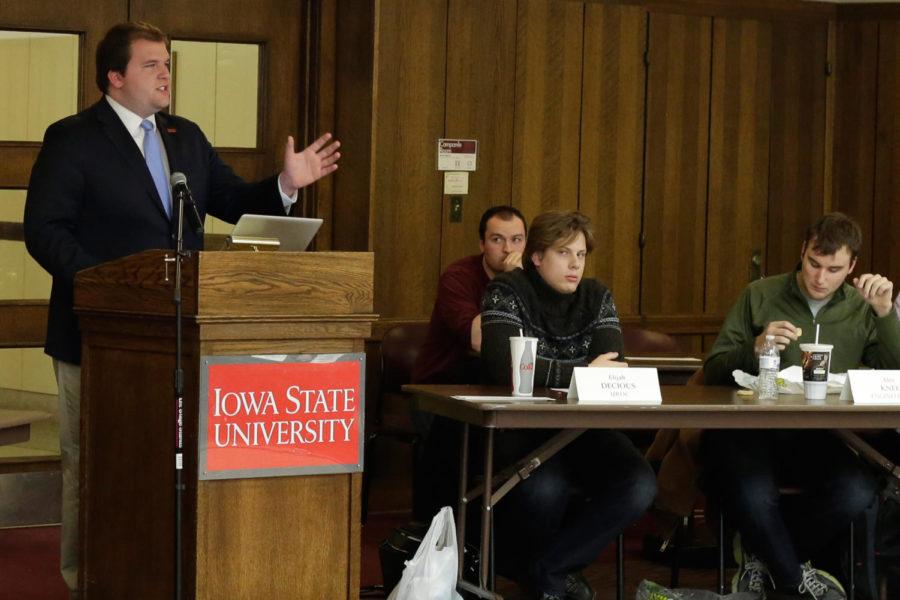GSB approves elections code, bylaw changes
Brian Achenbach/Iowa State Daily
Spencer Hughes, president of the Government of the Student Body, addresses GSB before the open forum during their meeting on Dec. 4 in the Campanile Room of the Memorial Union.
December 6, 2013
After a debate that extended into Thursday morning, the GSB Senate passed provisions in both the bylaws as well as the election code.
Changes to the election bylaws will no longer require candidates for the senate to gather any signatures. Executive tickets will require 500 signatures on a petition to be on the ballot, down from the previous number at 1,000.
Sen. Gage Kensler said he believed eliminating the signature requirement for senate candidates would make running for GSB easier, and therefore increase competition in elections for senate positions.
“I don’t think it’s really engaging or interacting with the student body by just saying, ‘Here, sign this sheet.’ I think that, if anything, it would leave a bad impression of GSB on that student … and they sign it and that’s the last they see you,” Kensler said.
Election Commissioner Adam Guenther argued that reaching out to constituents to receive signatures was important.
Sen. Khayree Fitten said it is relatively easy to get signatures, and therefore, obtaining them does not serve its purpose.
An enacted clause recommended by the election commission that would have required senate candidates on the ballot to attend meetings of two separate clubs was amended and eliminated.
Guenther argued that attending club meetings would be beneficial and would be a good public relations way to get the word out about the elections.
Revisions to the election code were also made.
An amendment made by Fitten to end campaign spending limits failed. Fitten submitted and subsequently withdrew a petition earlier this year that argued campaign spending limits are unconstitutional due to a U.S. Supreme Court ruling in Citizen’s United v. Federal Election Commission.
A bill passed that will allow the election commission to operate a polling place on Election Day. Any other entity wanting to operate a polling location will also be able to do so with approval from the election commission.
In recent elections, voting has been done electronically. Sen. Zach Bauer, who made the amendment for the polling place, said it would help increase voter turnout.
In addition, previous rules limiting campaigning on election day were struck down.
“This summer I attended a national conference of student body presidents, and about 100 of us were in attendance,” said GSB President Spencer Hughes. “We were discussing election regulations. And I mentioned that we were barred from campaigning while polls were open, and I tell you that no one believed me
Hughes said to the best of his knowledge Iowa State’s rule of no active campaigning on election day is unique compared to similar institutions.
Also included in the bill was a clause that will allow GSB campaign material to be included electronically.
Another amendment to the bill changed the election code in a way that will no longer require campaigns to count volunteer services against their spending limit at a fair market value.
In the past, candidates were asked to determine the fair market value of their volunteer services and count it as part of their total spending, regardless of if they paid an individual for the service or not.

















